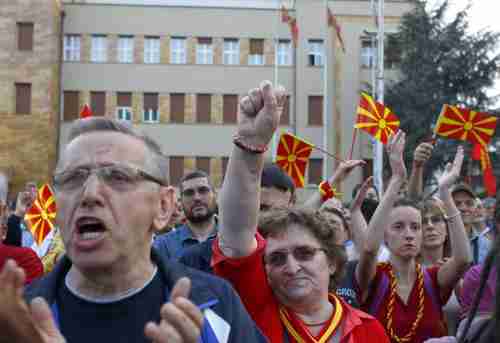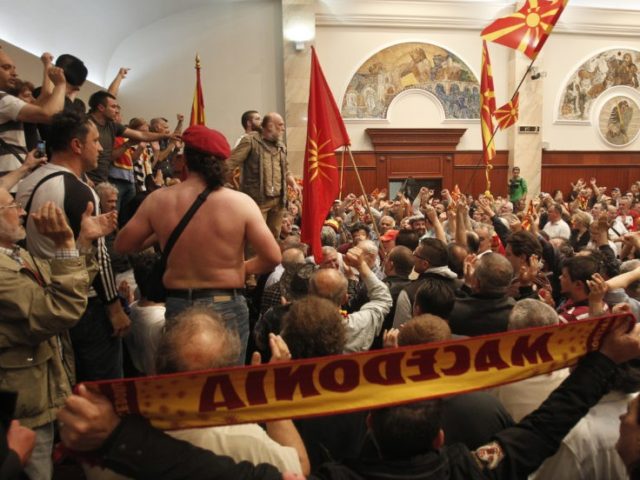This morning’s key headlines from GenerationalDynamics.com
- European officials worry that Macedonia’s chaos could destabilize the Balkans
- Macedonia comments reveal acrimonious divisions in the Western Balkans
European officials worry that Macedonia’s chaos could destabilize the Balkans

Protesters in front of parliament in Skopje, Macedonia, on Tuesday (Reuters)
Two weeks ago, thousands of ethnic nationalist Macedonians surrounded Macedonia’s parliament building in the capital city Skopje, and then stormed the building, as we reported at the time. More than 100 people were injured, including protestors, policemen and lawmakers.
The protests have been continuing, although there has been no further violence, but there are concerns of more violence when a political deadline passes in ten days.
The protests were triggered when an ethnic Albanian, Talat Xhaferi, was elected Speaker of the Parliament. Xhaferi was also a leader of the Albanian anti-government rebellion in a brief Albanian-Macedonian non-crisis civil war in 2001, raising new fears about a renewal of the civil war.
Macedonia’s politics became chaotic after December 11 of last year, when an election was held giving the two major parties, the SDSM (Social Democrats), led by Zoran Zaev, and the VMRO-DPMNE, led by Nikola Gruevski, an almost equal number of seats in the parliament.
The SDSM party broke the deadlock by forming a coalition with several Albanian parties, thus giving themselves a parliamentary majority, controlling at least 67 of the 120 seats in parliament. However, the VMRO party under Prime Minister Gruevski have been governing the country for more than a decade, and were reluctant to give up power. The situation was further complicated by the fact that if Gruevski loses power, then he is liable to go to jail over accusations of mass-wiretapping of opposition politicians. Two years ago, a wiretapping scandal revealed that the government had tapped the phones of over 26,000 people, including politicians, journalists, and civil society activists.
Since December, the government has been in chaos, since the pro-Macedonian president, Gjorge Ivanov, refused to recognize the SDSM government and allow Zaev to become prime minister. He claimed that doing so would “Albanianize” Macedonia by allowing wider official use of the Albanian language, which was a demand of the Albanian parties in return for joining the SDSM coalition.
So two weeks ago, the SDSM and Albanian coalition in the parliament selected ethnic Albanian Talat Xhaferi as speaker of the parliament. This selection infuriated Ivanov and the nationalist Macedonian supporters of the VMRO party, triggering the bloody riots. The protests have been continuing since then, with thousands of VMRO supporters turning out in Skopje on Tuesday, although there has been no more violence.
On Thursday, Xhaferi sent a letter to Ivanov, noting that a “parliament majority has been established” and that he expects the president to act according to the constitution, and give control of the government to the SDSM, and allow Zoran Zaev to become prime minister, putting an end to more than a decade in power for the VMRO.
Ivanov has not yet confirmed that he received the letter. He has ten days to respond to the letter. No matter what action or inaction he takes on that day, there may be more violence. Balkan Insight and European Council On Foreign Relations and BBC
Related Articles
Macedonia comments reveal acrimonious divisions in the Western Balkans
The article on Macedonia that I wrote two weeks ago was cross-posted as usual on the Breitbart National Security site, and received dozens of the most acrimonious and vitriolic comments that any of my articles have ever received. These comments came from all sides – especially the Macedonians, the Greeks, the Albanians and the Bulgarians.
Greek commenters were particularly infuriated by my brief history of Alexander the Great, referring to him as “the most famous leader in Macedonia’s history.” Here’s a brief summary of the comments by Greek readers:
- Alexander the Great was Greek, and, in fact, all Macedonians at the time were Greek.
- Macedonians don’t exist anymore. The country was taken over by Albanians and colonized by ethnic Bulgarians in the Middle Ages. Today’s “Macedonians” are really ethnic Bulgarians, with no ties to ancient Macedonia.
- Macedonia is a fake country. It should be split up, with the west given to Albania and the east to Bulgaria.
Macedonians reject all of this:
- There are Russian and Turkish documents from the 1700s clearly referring to Macedonian as distinct from Serbians or Bulgarians. The oldest surviving identity in Europe is Macedonian.
- Macedonians don’t want to be part of Bulgaria, and the Bulgarians don’t want the Macedonians, because they are Macedonians.
There is an interesting question here: How long do two population groups have to be separated before they can be called separate ethnic groups? It may (or may not) be true that Macedonians were Bulgarians in the Middle Ages, but that was many centuries ago. Having been apart from the Bulgarians for centuries, today they are recognized as a distinct Macedonian ethnic group by almost every nation outside of Greece, and they’re recognized by the United Nations and European Union as Macedonians.
As for Alexander the Great, today’s Macedonians and Greeks each claim him as their own. This is an issue that will probably never be settled peacefully.
A number of Albanian commenters criticized my use of the phrase “Greater Albania,” a movement to enlarge Albania by including ethnic Albanian populations from neighboring countries, including Macedonia and Kosovo. Some claimed that no such movement exists, although that claim appears not to be true, as can be determined by googling the words “Greater Albania.” However, other comments gave a more nuanced explanation, that the phrase “Greater Albania” was invented by the Serbs and the Russians to cover up a movement for a “Greater Serbia.”
One commenter said, “We Albanian Muslims live in peace with Christian Albanians. It’s only the Serbs and Macedonians who we cannot live in peace with us due to historical territorial claims.”
There is some truth to the claim of meddling by the Russians. The Russian government is backing the VMRO and Nikola Gruevski, and Russia’s foreign ministry issued a statement in March:
With active cooperation of the EU and NATO officials, an ‘Albanian platform’ created in Tirana [Albania’s capital city], in the office of the (Albanian) prime minister, is being imposed on Macedonians.
My article on Macedonia is turning out to be one of the most acrimoniously contentious that I’ve ever written, with extreme ideologues on both sides posting vitriolic comments. My conclusion from this situation is that history is repeating itself in the sense that the Balkans region is one of the most explosive regions in the world.
The Albanians and Turks are mostly Muslim. The Macedonians, Bulgarians, Serbs, Greeks and Russians are all mostly Orthodox Christian. The Muslim and Orthodox Christian civilizations have had repeated massive wars for centuries, centered in the Balkans, Crimea, and the Caucasus. And as I’ve been saying for years, Generational Dynamics predicts that there is going to be another massive civilizational war between Muslims and Orthodox Christians.
The conflict between ethnic Macedonians and ethnic Albanians, with outside “meddling” from Russia, Serbia, Greece, Albania, and the EU, is a microcosm of this coming massive civilizational war, which is why this is an important story. And there have been reports of increasing use of social media in the Balkans to promote neo-Nazism and white supremacy.
There has been speculation by me and others about where WW III would start — South China Sea, Kashmir, Mideast, etc. But now I would have to say that the Balkans is moving close to the top of the list. EurActiv and Reuters (2-Mar) and Balkan Insight
Related Articles
- Macedonia declares state of emergency along border with Greece (22-Aug-2015)
- A train station in Macedonia becomes the new European migrant choke point (19-Aug-2015)
- 22 die in Macedonian police gun battles with Albanian militants (11-May-2015)
KEYS: Generational Dynamics, Macedonia, Albania, Greece, Talat Xhaferi, Social Democrats, SDSM, Zoran Zaev, VMRO-DPMNE, Nikola Gruevski, Gjorge Ivanov, Bulgaria, The Former Yugoslav Republic of Macedonia, FYROM, Alexander the Great, Russia, Turkey, Serbia, Greater Albania, Greater Serbia
Permanent web link to this article
Receive daily World View columns by e-mail

COMMENTS
Please let us know if you're having issues with commenting.